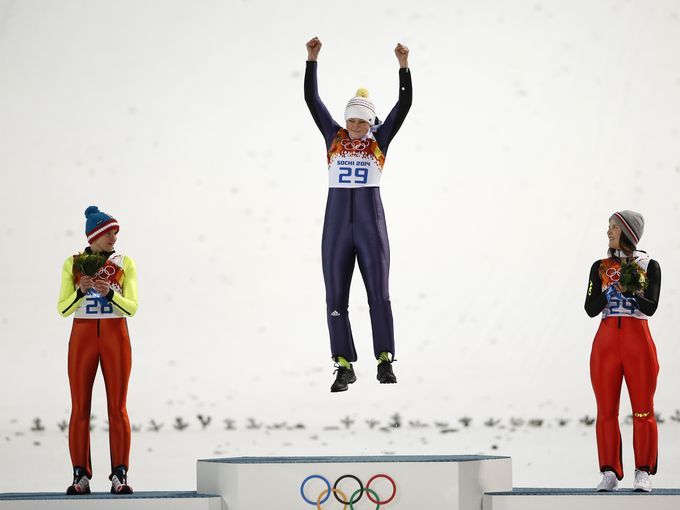 Carina Vogt of Germany is pleased with her jump. Photo:usatoday.Germany's Carina Vogt won a historic gold, Austria's Daniela Iraschko-Stolz took silver and Coline Mattel of France bronze in the Olympic debut of women's ski jump, leaving a three-skier American team savoring the symbolism of the moment rather than Winter Games glory, usatoday.com reports.
Carina Vogt of Germany is pleased with her jump. Photo:usatoday.Germany's Carina Vogt won a historic gold, Austria's Daniela Iraschko-Stolz took silver and Coline Mattel of France bronze in the Olympic debut of women's ski jump, leaving a three-skier American team savoring the symbolism of the moment rather than Winter Games glory, usatoday.com reports.
For Sarah Hendrickson of Park City, Utah, a return to international competition after nearly a six-month absence because of a knee injury ended in disappointment. She came in 21st out of 40 skiers, a rare out-of-contention finish for a skier whose pre-injury form placed her in a select, elite group of female jumpers.
Yet despite her finish, Hendrickson could appreciate the meaning behind her bib number — No. 1, first of 30 ski jumpers, making her the first female in history to jump in the Olympic Games.
"When I was given the bib number I didn't really realize the significance of it, that I was the first girl ever to jump in an Olympic event," Hendrickson said. "That's something special to grasp onto. I'm proud of that."
Against the backdrop of competition, the gold-medal event at Russki Gorki Jumping Center marked for all female jumpers the culmination of a decades-long battle for Olympic equality.
"It's the most important step for women's ski jumping to get to the Olympics because it's the highest level of winter sports you can reach," Iraschko-Stolz said. "Now we are here and we had a really good competition. It was so high-level, it was so close, and I think everyone who watched this competition here or on TV needs to like women's ski jumping now."
The sentiment rings truest for American Olympians such as Jessica Jerome and Lindsey Van, two experienced jumpers who stood front and center in the push for Winter Games inclusion.
"It was fun. It was a lot of fun," Jerome said. "There's a special camaraderie all the girls have, from all the countries, and I really felt it tonight. We were up there high-fiving with the Finns, the Canadian girls."
Jerome, who placed 10th with a score of 234.1, was the top American finisher. Van (227.2) came in 15th.
"I didn't perform to my best ability, but I'm still happy, strangely, I think everyone is," Jerome said. "I think all the girls from all the countries are smiling."
Smiles and all, the three U.S. skiers — and 24 others, including gold favorite Sara Takahashi of Japan — were left staring up at Vogt (247.4), Iraschko-Stolz (246.2) and Mattel (245.2). Vogt's victory came on the last jump of the second round, when she was left needing a score of at least 119.5 to bypass Iraschko-Stolz and claim gold. She scored a 120.6, giving her the medal.
"I was just thinking about the jump," Vogt said. "Until now, I am a little bit surprised that I could manage with that amount of pressure that I had. This is a fantastic thing for me."
The USA's chances at a medal would have improved dramatically had Hendrickson been at full speed, not breaking back into form after an extended injury-caused break.
But the 19-year-old was clearly still slowed by last summer's knee injury. Hendrickson tore her ACL and MCL during a training run at an event in Oberstdorf, Germany, a setback that led to several months of rigorous rehabilitation and physical therapy.
While Hendrickson posted far stronger jumps than during the two training days leading up the medal round, she still showed signs of rust. She attempted only four jumps total during the two Olympic training days, and she estimated Sunday she'd taken no more than 30 all year, compared with as many as 300 for her competition.
"I could blame it on that, I guess," Hendrickson said. "I try not to think of that way. I wanted to have no regrets. But I guess I would blame it more on not having enough training events at home."
 В Атырау -10
В Атырау -10